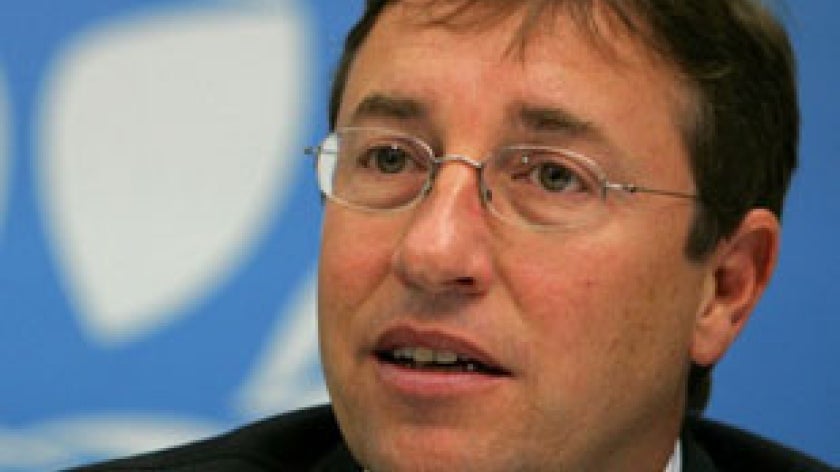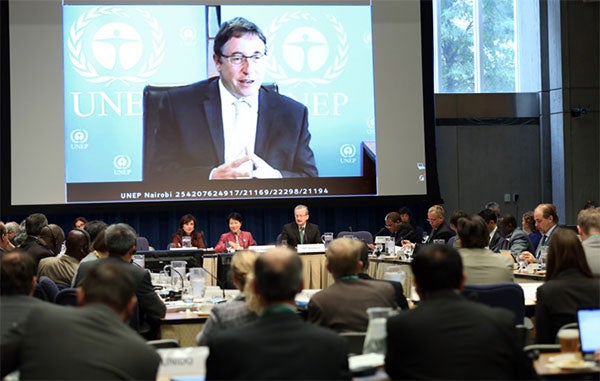
On November 6, 2013 Achim Steiner, the Executive Director of UNEP, addressed the participants at the 45th GEF Council Meeting. Here are the highlights of his speech.
 unep-speech.jpg
unep-speech.jpg

November 2013 GEF Council
Highlights of the Speech of the Executive Director of UNEP,
Achim Steiner
The GEF CEO has asked the Heads of the three Implementing Agencies of the GEF to dialogue with the Council during its Fall and Spring Sessions, reflecting among others on the discussions held during the recently reinstated Heads of Agencies meetings. We welcome this opportunity to strengthen the GEF Partnership.
1. GEF is the leading global facility for achieving global environmental benefits and supporting the implementation of multi-lateral environmental agreements, and should be endowed with a robust replenishment.
a. In Rio+20, Members States asked that there be more coherence in the financial landscape for sustainable development; our challenge today is to help the GEF focus its efforts so as to be complementary to other public funds, and continue to incentivize more private sector and other innovative sources of financing. The GEF can do more to enable large scale private sector financial flows to more environmentally sound and innovative projects/initiatives.
b. We support the new direction offered by the GEF Vision 2020 to focus on drivers of change and not just the pressures.
i. A focus on the drivers of change help the GEF to place itself more upstream, focusing on enabling environments, capacity development and technology transfer, and regional and global cooperation.
ii. The drivers of change often go beyond the environmental dimension, and for that reason, the GEF’s mandate to be incremental to development financing puts it in an ideal position to help fill in missing gaps, and better leverage transformational change.
iii. Following the 2nd Replenishment Meeting, Agencies have started a concerted conversation with the GEF Secretariat on the Signature Programs. Potentially, these programs could provide a good opportunity to promote regional and global cooperation to address emerging environmental issues; and to benefit from the strategic scientific, technical and investment work of the agencies. In the coming months, we expect to further discuss the modalities and operational details of how the Signature Programs link with the focal area strategies, build on programmatic approaches, and make the use of global and regional set aside resources under the focal area programmes more effective.
2. GEF’s strengths lie in leveraging its Partnership
The three Implementing Agencies commit to continue to support the GEF Secretariat in defining new strategies and policies at the corporate level, and to continue to promote greater visibility for activities the GEF finances. We support an active healthy partnership which promotes dialogue from different perspectives for informed decisions.
a. In all its achievements, the GEF has not acted alone. The “GEF” is a network of entities that working together have achieved more than what a single agency could have.
b. The Partnership has expanded over the years. This broadening gives a historical opportunity to leverage stronger action on global environmental issues when Agencies commit to mainstream environment into their development portfolios.
c. After 20 years, there are a tremendous amount of lessons and best practices available from the GEF Agency portfolios, as also identified in the Vision 2020. Agencies commit to work closer with each other and with GEF Secretariat technical teams, STAP and Evaluation Office, to find resources to codify, share and uptake the knowledge.
d. The GEF Secretariat can enhance its cooperation with Agencies by:
i. Regular Inter-Agency meetings could be organized, building on existing modalities, to discuss pipelines and portfolios for Work Program inclusion.
ii. National and regional GEF programming and constituency workshops should better leverage the technical and policy support of Agencies.
iii. The results of the meetings of the Heads of Agencies should be regularly communicated to Council, as envisaged in the Instrument.
3. GEF should continue to streamline so as to become more and more efficient and effective.
a. The project cycle has become too complex and needs to be further streamlined, but not at the cost of quality of design and efficiency of implementation. Long preparation time is often a sign of good quality and participatory processes not of inefficiency. We need to recognize that there could be real cost trade-offs where countries and agencies work to adhere to more stringent or detailed requirements, versus their capacity to deliver high quality and high risk projects. The adequacy of funding to carry out all these activities can constrain the level of engagement in corporate activities such as knowledge management.
b. Agencies have undertaken efforts to achieve greater efficiency and streamlining in their own procedures, and combining this with greater efficiency in the GEF portfolio, will be a win-win for all.
4. Concluding remarks:
Speaking on behalf of the three Implementing Agencies, the Executive Director said:
a. We are committed to helping the GEF the premier entity for financing of the global environment. We welcome steps taken to enhance dialogue with the GEF Secretariat and look forward to a stronger Partnership.
b. We encourage the donor community, both traditional and new contributors, to work towards a significantly robust replenishment for GEF-6, to urgently address the growing and critical environmental issues. The mandate of GEF has increased – with the addition of Mercury, and better understanding of costs of inaction in biodiversity, land degradation, water and marine management, and sound chemical management. The world is poised to conclude on a new deal to address both climate change mitigation and adaptation, aiming to keep the global emissions below 2 degrees, providing greater clarity on the cost of inaction as well as the relative mandates, roles and responsibilities of the different institutions including financial mechanisms of the UNFCCC.
c. Developing and developed countries are intertwined in a more globalized world, where actions are interdependent on each other. For all these reasons, a less than robust replenishment will only send negative signals to countries and perhaps reverse 20 years of growing commitment for changing the enabling environment towards greater sustainability of actions and decisions.
Finally, speaking on behalf of UNEP, the Executive Director noted that there is a need for greater dialogue between the GEF and the newly established United Nations Environment Assembly (UNEA). In addition, the GEF has and should continue to contribute to sustainable development efforts, including the emerging SDGs, while remaining a distinct and dedicated instrument for financing the global environmental dimension.